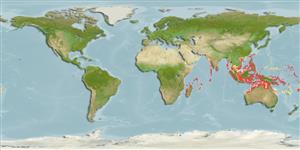>
Beloniformes (Needle fishes) >
Zenarchopteridae (Internally fertilized halfbeaks)
Etymology: Zenarchopterus: Particle zen, derived from zao = to give life + Greek, archos = anus + Greek, pteron = fin.
More on author: Smith.
Environment: milieu / climate zone / depth range / distribution range
Ekologi
marina; sötvatten; brackvatten revassocierade; amfidrom (Ref. 59012); djupintervall 0 - ? m. Tropical
Indo-Pacific: Madagascar, Mozambique, Seychelles Island, Andaman Islands, East Indies, Caroline Islands, Fiji, Guam and northern Australia. Also India (Ref. 43081)
Size / Vikt / Age
Maturity: Lm ? range ? - ? cm
Max length : 20.0 cm TL hane/ej könsbestämd; (Ref. 4833)
Taggstrålar i ryggfenan (totalt): 0; Mjukstrålar i ryggfenan (totalt): 10-12; Taggstrålar i analfenan 0; Mjukstrålar i analfenan: 11 - 13; Ryggkotor: 38 - 39. Upper jaw about as long as wide. Top of snout uniform brown. Sixth anal ray of males greatly enlarged and elongated, reaching the tip of the caudal fin in adults. Fourth dorsal ray of adult males elongated, thickened distally, curving back to the base of the caudal fin. Vertebrae 38-39. Dorsal rays 10 in females and 11 or 12 in males. Anal rays 10-12 in females and 13 in males.
Found mainly in marine waters, but enter estuaries and tidal rivers (Ref. 4833) and mangrove areas (Ref. 48635).
Life cycle and mating behavior
Könsmognad | Reproduktion | Lek | Ägg | Fecundity | Larver
Ovoviviparous.
Collette, B.B., 1974. The garfishes (Hemiramphidae) of Australia and New Zealand. Records of the Australian Museum 29(2):11-105. (Ref. 10988)
IUCN Red List Status (Ref. 130435)
Threat to humans
Harmless
Human uses
Ytterligare information
referenserVattenbrukVattenbruksprofilAvelslinjerGenetikElectrophoresesÄrftlighetSjukdomarBehandlingNutrientsMass conversion
MedarbetareBilderStamps, Coins Misc.LjudCiguateraHastighetSimsättGälytaOtolithsHjärnstorlekSyn
Verktyg
Special reports
Download XML
Internet-källor
Estimates based on models
Preferred temperature (Ref.
123201): 26.6 - 29, mean 28.3 °C (based on 952 cells).
Phylogenetic diversity index (Ref.
82804): PD
50 = 0.5000 [Uniqueness, from 0.5 = low to 2.0 = high].
Bayesian length-weight: a=0.00457 (0.00200 - 0.01044), b=3.03 (2.83 - 3.23), in cm total length, based on LWR estimates for this (Sub)family-body shape (Ref.
93245).
Trofisk nivå (Ref.
69278): 2.9 ±0.5 se; based on size and trophs of closest relatives
Fishing Vulnerability (Ref.
59153): Low vulnerability (10 of 100).
Nutrients (Ref.
124155): Calcium = 149 [56, 313] mg/100g; Iron = 0.815 [0.368, 1.873] mg/100g; Protein = 17.6 [15.5, 19.6] %; Omega3 = 0.116 [0.050, 0.331] g/100g; Selenium = 18.1 [8.6, 40.4] μg/100g; VitaminA = 167 [46, 643] μg/100g; Zinc = 1.79 [1.12, 2.84] mg/100g (wet weight);
